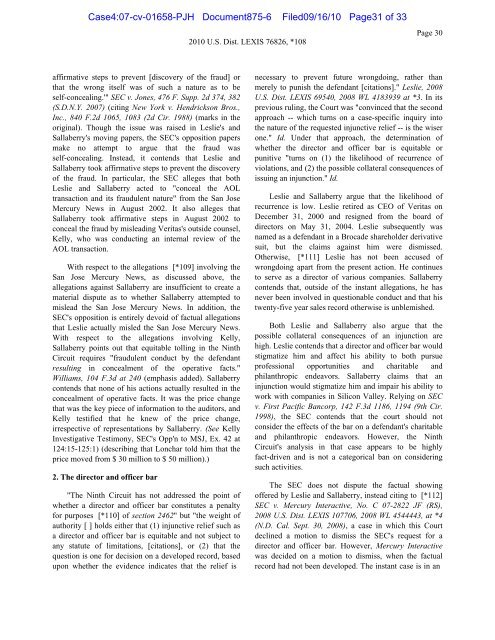exhibit 2 - SAP Lawsuit Portal
exhibit 2 - SAP Lawsuit Portal
exhibit 2 - SAP Lawsuit Portal
Create successful ePaper yourself
Turn your PDF publications into a flip-book with our unique Google optimized e-Paper software.
Case4:07-cv-01658-PJH Document875-6 Filed09/16/10 Page31 of 33<br />
affirmative steps to prevent [discovery of the fraud] or<br />
that the wrong itself was of such a nature as to be<br />
self-concealing.'" SEC v. Jones, 476 F. Supp. 2d 374, 382<br />
(S.D.N.Y. 2007) (citing New York v. Hendrickson Bros.,<br />
Inc., 840 F.2d 1065, 1083 (2d Cir. 1988) (marks in the<br />
original). Though the issue was raised in Leslie's and<br />
Sallaberry's moving papers, the SEC's opposition papers<br />
make no attempt to argue that the fraud was<br />
self-concealing. Instead, it contends that Leslie and<br />
Sallaberry took affirmative steps to prevent the discovery<br />
of the fraud. In particular, the SEC alleges that both<br />
Leslie and Sallaberry acted to "conceal the AOL<br />
transaction and its fraudulent nature" from the San Jose<br />
Mercury News in August 2002. It also alleges that<br />
Sallaberry took affirmative steps in August 2002 to<br />
conceal the fraud by misleading Veritas's outside counsel,<br />
Kelly, who was conducting an internal review of the<br />
AOL transaction.<br />
With respect to the allegations [*109] involving the<br />
San Jose Mercury News, as discussed above, the<br />
allegations against Sallaberry are insufficient to create a<br />
material dispute as to whether Sallaberry attempted to<br />
mislead the San Jose Mercury News. In addition, the<br />
SEC's opposition is entirely devoid of factual allegations<br />
that Leslie actually misled the San Jose Mercury News.<br />
With respect to the allegations involving Kelly,<br />
Sallaberry points out that equitable tolling in the Ninth<br />
Circuit requires "fraudulent conduct by the defendant<br />
resulting in concealment of the operative facts."<br />
Williams, 104 F.3d at 240 (emphasis added). Sallaberry<br />
contends that none of his actions actually resulted in the<br />
concealment of operative facts. It was the price change<br />
that was the key piece of information to the auditors, and<br />
Kelly testified that he knew of the price change,<br />
irrespective of representations by Sallaberry. (See Kelly<br />
Investigative Testimony, SEC's Opp'n to MSJ, Ex. 42 at<br />
124:15-125:1) (describing that Lonchar told him that the<br />
price moved from $ 30 million to $ 50 million).)<br />
2. The director and officer bar<br />
"The Ninth Circuit has not addressed the point of<br />
whether a director and officer bar constitutes a penalty<br />
for purposes [*110] of section 2462" but "the weight of<br />
authority [ ] holds either that (1) injunctive relief such as<br />
a director and officer bar is equitable and not subject to<br />
any statute of limitations, [citations], or (2) that the<br />
question is one for decision on a developed record, based<br />
upon whether the evidence indicates that the relief is<br />
2010 U.S. Dist. LEXIS 76826, *108<br />
Page 30<br />
necessary to prevent future wrongdoing, rather than<br />
merely to punish the defendant [citations]." Leslie, 2008<br />
U.S. Dist. LEXIS 69540, 2008 WL 4183939 at *3. In its<br />
previous ruling, the Court was "convinced that the second<br />
approach -- which turns on a case-specific inquiry into<br />
the nature of the requested injunctive relief -- is the wiser<br />
one." Id. Under that approach, the determination of<br />
whether the director and officer bar is equitable or<br />
punitive "turns on (1) the likelihood of recurrence of<br />
violations, and (2) the possible collateral consequences of<br />
issuing an injunction." Id.<br />
Leslie and Sallaberry argue that the likelihood of<br />
recurrence is low. Leslie retired as CEO of Veritas on<br />
December 31, 2000 and resigned from the board of<br />
directors on May 31, 2004. Leslie subsequently was<br />
named as a defendant in a Brocade shareholder derivative<br />
suit, but the claims against him were dismissed.<br />
Otherwise, [*111] Leslie has not been accused of<br />
wrongdoing apart from the present action. He continues<br />
to serve as a director of various companies. Sallaberry<br />
contends that, outside of the instant allegations, he has<br />
never been involved in questionable conduct and that his<br />
twenty-five year sales record otherwise is unblemished.<br />
Both Leslie and Sallaberry also argue that the<br />
possible collateral consequences of an injunction are<br />
high. Leslie contends that a director and officer bar would<br />
stigmatize him and affect his ability to both pursue<br />
professional opportunities and charitable and<br />
philanthropic endeavors. Sallaberry claims that an<br />
injunction would stigmatize him and impair his ability to<br />
work with companies in Silicon Valley. Relying on SEC<br />
v. First Pacific Bancorp, 142 F.3d 1186, 1194 (9th Cir.<br />
1998), the SEC contends that the court should not<br />
consider the effects of the bar on a defendant's charitable<br />
and philanthropic endeavors. However, the Ninth<br />
Circuit's analysis in that case appears to be highly<br />
fact-driven and is not a categorical ban on considering<br />
such activities.<br />
The SEC does not dispute the factual showing<br />
offered by Leslie and Sallaberry, instead citing to [*112]<br />
SEC v. Mercury Interactive, No. C 07-2822 JF (RS),<br />
2008 U.S. Dist. LEXIS 107706, 2008 WL 4544443, at *4<br />
(N.D. Cal. Sept. 30, 2008), a case in which this Court<br />
declined a motion to dismiss the SEC's request for a<br />
director and officer bar. However, Mercury Interactive<br />
was decided on a motion to dismiss, when the factual<br />
record had not been developed. The instant case is in an


